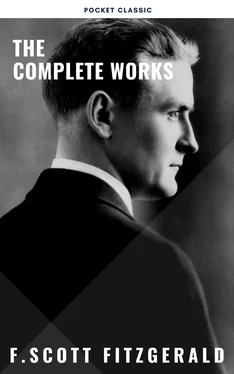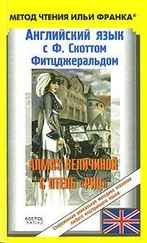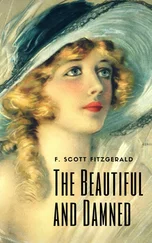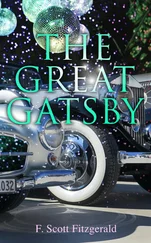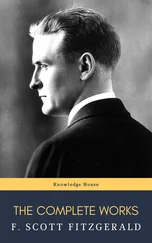F. Scott Fitzgerald - The Complete Works of F. Scott Fitzgerald
Здесь есть возможность читать онлайн «F. Scott Fitzgerald - The Complete Works of F. Scott Fitzgerald» — ознакомительный отрывок электронной книги совершенно бесплатно, а после прочтения отрывка купить полную версию. В некоторых случаях можно слушать аудио, скачать через торрент в формате fb2 и присутствует краткое содержание. Жанр: unrecognised, на английском языке. Описание произведения, (предисловие) а так же отзывы посетителей доступны на портале библиотеки ЛибКат.
- Название:The Complete Works of F. Scott Fitzgerald
- Автор:
- Жанр:
- Год:неизвестен
- ISBN:нет данных
- Рейтинг книги:4 / 5. Голосов: 1
-
Избранное:Добавить в избранное
- Отзывы:
-
Ваша оценка:
- 80
- 1
- 2
- 3
- 4
- 5
The Complete Works of F. Scott Fitzgerald: краткое содержание, описание и аннотация
Предлагаем к чтению аннотацию, описание, краткое содержание или предисловие (зависит от того, что написал сам автор книги «The Complete Works of F. Scott Fitzgerald»). Если вы не нашли необходимую информацию о книге — напишите в комментариях, мы постараемся отыскать её.
The first table of contents (at the very beginning of the ebook) lists the titles of all novels included in this volume. By clicking on one of those titles you will be redirected to the beginning of that work, where you'll find a new TOC that lists all the chapters and sub-chapters of that specific work.
The Complete Works of F. Scott Fitzgerald — читать онлайн ознакомительный отрывок
Ниже представлен текст книги, разбитый по страницам. Система сохранения места последней прочитанной страницы, позволяет с удобством читать онлайн бесплатно книгу «The Complete Works of F. Scott Fitzgerald», без необходимости каждый раз заново искать на чём Вы остановились. Поставьте закладку, и сможете в любой момент перейти на страницу, на которой закончили чтение.
Интервал:
Закладка:
Well, he’d find out the whole muddled business in about three minutes, and a lot of good it’d do anybody else left in the muddle. Damned muddle—everything a muddle, everybody offside, and the referee gotten rid of—everybody trying to say that if the referee were there he’d have been on their side. He was going to go and find that old referee—find him—get hold of him, get a good hold—cling to him—cling to him—ask him—
— ◆ —
The Pierian Springs and the Last Straw.
Nassau Literary Magazine (October 1917)
My Uncle George assumed, during my childhood, almost legendary proportions. His name was never mentioned except in verbal italics. His published works lay in bright, interesting bindings on the library table—forbidden to my whetted curiousity [curiosity] until I should reach the age of corruption. When one day I broke the orange lamp into a hundred shivers and glints of glass, it was in search of closer information concerning a late arrival among the books. I spent the afternoon in bed and for weeks could not play under the table because of maternal horror of severed arteries in hands and knees. But I had gotten my first idea of Uncle George—he was a tall, angular man with crooked arms. His opinion was founded upon the shape of the handwriting in which he had written, “To you, my brother, with heartiest of futile hopes that you will enjoy and approve of this: George Rombert.” After this unintelligible beginning, whatever interest I had in the matter waned, as would have all my ideas of the author, had he not been a constant family topic.
When I was eleven I unwillingly listened to the first comprehensible discussion of him. I was fidgeting on a chair in barbarous punishment when a letter arrived and I noticed my father growing stern and formidable as he read it. Instinctively I knew it concerned Uncle George—and I was right.
“What’s the matter Tom?—Someone sick?” asked my mother rather anxiously.
For answer Father rose and handed her the letter and some newspaper clippings it had enclosed. When she had read it twice (for her naive curiosity could never resist a preliminary skim) she plunged—
“Why should she write to you and not to me?”
Father threw himself wearily on the sofa and arranged his long limbs decoratively.
“It’s getting tiresome, isn’t it? This is the third time he’s become—involved.” I started, for I distinctively heard him add under his breath, “Poor damn fool!”
“It’s much more than tiresome,” began my mother. “It’s disgusting; a great strong man with money and talent and every reason to behave and get married (she implied that these words were synonymous) playing around with serious women like a silly, conceited college boy. You’d think it was a harmless game!”
Here I put in my word. I thought that perhaps my being de trop in the conversation might lead to an early release.
“I’m here,” I volunteered.
“So I see,” said Father in the tones he used to intimidate other young lawyers downtown; so I sat there and listened respectfully while they plumbed the iniquitous depths.
“It is a game to him,” said my father. “That’s all part of his theory.”
My mother sighed. “Mr. Sedgewick told me yesterday that his books had done inestimable harm to the spirit in which love is held in this country.”
“Mr. Sedgewick wrote him a letter,” remarked my father rather dryly, “and George sent him the book of Solomon by return post—”
“Don’t joke, Thomas,” said Mother, crowding her face with eyes. “George is treacherous, his mind is unhealthy—”
“And so would mine be, had you not snatched me passionately from his clutches—and your son here will be George the second, if he feeds on this sort of conversation at his age.” So the curtain fell upon my Uncle George for the first time.
Scrappy and rough-pieced information on this increasingly engrossing topic fitted gradually into my consciousness in the next five years, like the parts of a picture puzzle. Here is the finished portrait from the angle of seventeen years—Uncle George was a Romeo and a misogamist, a combination of Byron, Don Juan, and Bernard Shaw, with a touch of Havelock Ellis for good measure. He was about thirty, had been engaged seven times and drank ever so much more than was good for him. His attitude toward women was the pièce-de-résistance of his character. To put it mildly he was not an idealist. He had written a series of novels, all of them bitter, each of them with some woman as the principal character. Some of the women were bad. None of them were quite good. He picked a rather weird selection of Lauras to play muse to his whimsical Petrarch; for he could write, write well.
He was the type of author who gets dozens of letters a week from solicitors, aged men and enthusiastic young women who tell him that he is “prostituting his art” and “wasting golden literary opportunities.” As a matter of fact he wasn’t. It was very conceivable that he might have written better despite his unpleasant range of subject, but what he had written had a huge vogue that, strangely enough, consisted not of the usual devotees of prostitute art, the eager shopgirls and sentimental salesmen to whom he was accused of pandering, but of the academic and literary circles of the country. His shrewd tenderness with nature (that is, everything but the white race), his well-drawn men and the particularly cynical sting to his wit gave him many adherents. He was ranked in the most staid and severe of reviews as a coming man. Long psychopathic stories and dull germanized novels were predicted of him by optimistic critics. At one time he was the Thomas Hardy of America, and he was several times heralded as the Balzac of his century. He was accused of having the great American novel in his coat pocket, trying to peddle it from publisher to publisher. But somehow neither matter nor style had improved; people accused him of not “living.” His unmarried sister and he had an apartment where she sat greying year by year with one furtive hand on the bromo-seltzer and the other on the telephone receiver of frantic feminine telephone calls. For George Rombert grew violently involved at least once a year. He filled columns in the journals of society gossip. Oddly enough most of his affairs were with debutantes—a fact which was considered particularly annoying by sheltering mothers. It seemed as though he had the most serious way of talking the most outrageous nonsense, and as he was most desirable from an economic point of view, many essayed the perilous quest.
Though we had lived in the East since I had been a baby, it was always understood that home meant the prosperous Western city that still supported the roots of our family tree. When I was twenty I went back for the first time and made my only acquaintance with Uncle George.
I had dinner in the apartment with my aunt, a very brave, gentle old lady who told me, rather proudly, I thought, that I looked like George. I was shown his pictures from babyhood, in every attitude: George at Andover, on the Y.M.C.A. committee, strange anatomy; George at Williams in the center of the Literary Magazine Picture; George as head of his fraternity. Then she handed me a scrapbook containing accounts of his exploits and all favorable criticism of his work.
“He cares nothing at all about all this,” she explained. I admired and questioned, and remember thinking, as I left the apartment to seek Uncle George at his club, that between my family’s depressed opinion of him and my aunt’s elated one my idea of him was muddled to say the least. At the Iroquois Club I was directed to the grill, and there, standing in the doorway, I picked one out of the crowd, who, I was immediately sure, was he. Here is the way he looked at the time. He was tall with magnificent iron grey hair and the pale soft skin of a boy, most remarkable in a man of his mode of life. Drooping green eyes and a sneering mouth complete my picture of his physical self. He was rather drunk, for he had been at the club all afternoon and for dinner, but he was perfectly conscious of himself, and the dulling of faculties was only perceivable in a very cautious walk and a crack in his voice that sank it occasionally to a hoarse whisper. He was talking to a table of men, all in various stages of inebriation, and holding them by a most peculiar and magnetic series of gestures. Right here I want to remark that this influence was not dependent so much upon a vivid physical personality but on a series of perfectly artificial mental tricks, his gestures, the peculiar range of his speaking voice, the suddenness and terseness of his remarks.
Читать дальшеИнтервал:
Закладка:
Похожие книги на «The Complete Works of F. Scott Fitzgerald»
Представляем Вашему вниманию похожие книги на «The Complete Works of F. Scott Fitzgerald» списком для выбора. Мы отобрали схожую по названию и смыслу литературу в надежде предоставить читателям больше вариантов отыскать новые, интересные, ещё непрочитанные произведения.
Обсуждение, отзывы о книге «The Complete Works of F. Scott Fitzgerald» и просто собственные мнения читателей. Оставьте ваши комментарии, напишите, что Вы думаете о произведении, его смысле или главных героях. Укажите что конкретно понравилось, а что нет, и почему Вы так считаете.
